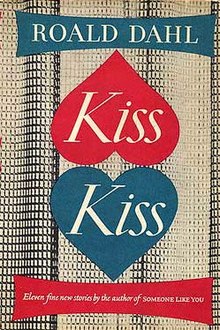the hostess
The landlady is a short story by Roald Dahl , which was first published in November 1959 in the American magazine The New Yorker under the original title The Landlady . It was first published in a collection of Roald Dahl's short stories in 1960 in Kiss Kiss. The German translation, entitled Die Wirtin von Wolfheinrich von der Mülbe, was found in the collection Küßchen, Küßchen! In 1966 . released. The short story is still very well known and is often used in school to illustrate what an open ending is.
Table of contents
Seventeen year old Billy Weaver has his first professional experience. At the beginning of the story, he is on a business trip and is looking for accommodation in Bath . He feels almost magically attracted by a sign that says " Bed & Breakfast" . The not very young landlady looks very friendly and her house is very cozy. She has two pets, a parrot in a cage and a dachshund lying in front of the fireplace. The landlady, who gives off a strange smell that Billy cannot identify, offers him tea. While they are drinking tea together, the landlady chats with Billy. She seems pleased to hear that he is still so young, and she also appreciates his anatomy. She also talks about her last two tenants, Mr. Temple and Mr. Mulholland. We learn that one was Billy's age, the other a little older. The landlady speaks of both in the past. Billy thinks he has heard the names before, and in the same context, possibly from the newspaper. Just as Billy thinks he can remember that Mr. Mulholland was an Eton student who went on a hike, the landlady interrupts him and claims "her" Mr. Mulholland studied elsewhere. The fact that the entries of the two tenants in the guest book are from two years ago doesn't seem to worry Billy, nor does the realization that the parrot is stuffed in the cage. Only when the landlady draws his attention to the fact that the dachshund is also stuffed does he show a certain emotion. To his astonishment he learns that this “excellent work” of a taxidermist was carried out by the landlady herself. She explains that she "stuffs all of her favorites". In addition, Billy learns that Mr. Temple and Mr. Mulholland have never moved out, but are both "accommodated" on the third floor. Billy, portrayed as naive throughout the story, refuses another cup of tea because the drink has a strange taste of bitter almonds that he doesn't like. The landlady mentions at the end that she has not had any guests for years. Except for Mr. Temple, Mr. Mulholland ... and Billy.
Open end?
The story presents a typical open ending. It breaks off before the reader learns what kind of fate Billy awaits. Yet enough evidence is given that there is little room for speculation. The landlady is a taxidermist, which explains her weird smell. Apparently the landlady not only prepares animals, but also people. Mr. Temple and Mr. Mulholland “were” of a certain age, but “are” on the third floor (although the cloakroom is empty). The reader is entitled to assume that they are no longer alive. The two stuffed animals point out what happened to the two men. The landlady already looks at Billy during the conversation like a collector on the hunt for a new, beautiful specimen. The taste and smell of bitter almonds is more familiar to most crime story readers than cyanide (the very poisonous salts of hydrogen cyanide). Most likely the landlady poisoned Billy and will prepare him too. The fact that this is not explicitly stated gives the reader the opportunity to picture it for themselves and either scare themselves or indulge in black humor .
the hostess
The narrator reports in the third person, exclusively from Billy's point of view. But the title draws attention to the landlady. The bizarrely characterized figure gives rise to many interpretations, whereby two perspectives predominate:
1. The landlady practices grooming as a hobby. Humans and animals seem equally suitable for them. It works in the same way as people who collect butterflies , bugs , birds and the like. Her aim is to capture and preserve as many fascinating “specimens” as possible. Whether she is mentally disturbed or of her sane mind is irrelevant for this approach to interpretation, it allows both interpretations.
2. The landlady is a mentally ill woman who suffers from her loneliness. She cannot stand the idea that her “pets”, which can mean both pet and darling, are leaving her. That is why she preserves them so that they stay with her forever.
See also
literature
- Roald Dahl: The landlady, in: kisses, kisses! Eleven unusual stories, Reinbek 1966, p. 7 - p. 14
- Kiss Kiss, New York 1960
- Donald Sturrock: Storyteller. The Authorized Biography of Roald Dahl, New York and London 2010
Web links
References and comments
- ↑ Sturrock, p. 626
